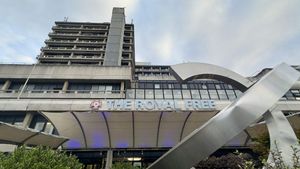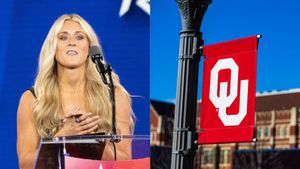Bill Clinton studied here, as did Margaret Thatcher. The town helped inspire J.R.R. Tolkien to pen
The Lord of the Rings, and his friend C.S. Lewis wrote the Narnia chronicles here too. Alumni include Aldous Huxley, T.S. Eliot, Indira Ghandi—as well as Hugh Grant, Dr. Seuss, and Mr. Bean himself, Rowan Atkinson. But perhaps the most celebrated character closely linked to the academic powerhouse that is the University of Oxford is none other than England’s greatest queer, Oscar Wilde himself. The town of Oxford is where “the love that dares not speak its name” spoke up first. It was in this quaint yet monumental town that the queer Lord Alfred Douglas, better known as Bosie, first published those words in a poem contributed to an Oxford literary journal.
The time was 1892, and Oscar Wilde was the cosseted darling of London’s smart set. His plays, poems, and bons mots were on everyone who was anyone’s lips. Bosie was a blushing boy toy undergraduate at Oxford’s Magdalen College—ripe for the fame, fortune, and free meals in tony restaurants that Oscar personified. After a mutual friend introduced them at a London high tea, Oscar and Bosie (both alumni of Magdalen) first courted and consummated their love in this city that Wilde considered “the most beautiful thing in England.” Only later was Wilde tried for the crime of his romance with Bosie, and sentenced to prison with hard labor, which contributed to his decline in health and eventual death.
Nowadays, this idyllic getaway just an hour from London by train is more than gay welcoming. The honey-hued “dreaming spires” of the medieval city’s colleges, ancient pubs filled to the groaning rafters with imbibing undergraduates, and willow-shaded restaurants with riverside views of muscular young oarsmen punting on the River Cherwell are still as refreshing and as unabashedly romantic as they were in Oscar’s and Bosie’s day. But “the love that dares not speak its name” shouts it from the rooftops now.
“Oxford is very gay-friendly,” one student was quoted at a recent gay pride festival. “Although most students go to London for the gay social scene, we feel very comfortable living and studying here. The scene is low-key and friendly.”
Travelers who want to re-create the turbulent romance of Wilde and Bosie can start by booking a weekend in the Oscar Wilde Deluxe Room at the Old Parsonage Hotel. A short walking distance from the High Street and the City Centre, the Old Parsonage is a late-15th-century building that let out rooms to students during Wilde’s day. Oscar’s old room—behind the office and up a winding staircase—is large and cottage-comfy. Church bells can be heard pealing through its streetside windows. Farther out of town—a 20-minute drive—is the überposh Le Manoir aux Quat’Saisons where Raymond Blanc’s fresh-from-the-garden cuisine seduces hedonists from all over the world. Stroll around the Manoir’s grounds and watch your evening greens harvested from the earth in front of you. A stay in the renovated stables, just off the main building, completes the rustic romance.
A weekend in Oscar’s Oxford should commence with a stroll around his and Lord Alfred Douglas’s old alma mater, Magdalen College. Ask the warden to point out Oscar’s rooms on the ground floor (just facing the modern day ladies’ toilets). When I visited, the current occupant had placed a gay rights decal prominently on the window. How different from Oscar’s day when “Grecian love,” was evident to insiders but hidden from the outside world.
Walk from Magdalen to Oxford’s busy High Street. Here, the Mitre Pub was a favorite place for Oscar to drink during curfew hours when he should have been in bed. Lord Alfred Douglas also had his student rooms on High Street when Oscar came to visit. Take a light meal here then head to The Bear pub for a pint of ale and a gawk at the gorgeousness of the Oxford student body. The ties on the wall were a tradition started in the 1950s by a lascivious pub owner’s wife who apparently collected a tie from each student to whom she gave her own “private lessons.” Continue your Oxford pub crawl with a stop at the Eagle and Child (or the Bird and Baby, as it’s called) the pub where Oxford literary pals the Inklings (including J.R.R. Tolkien and C.S. Lewis) used to meet for a Guinness and a pipe-smoking session around the old fireplace.
Sundays in Oxford are perfect for re-creating Oscar-era pleasures like early morning services at Christ Church, where the all-male choir sings (and look) like angels. After expiating your sins, go for a refreshing punt on the River Cherwell. A punt is a small, flat-bottomed skiff that is steered with a long gondolierlike pole that grapples the muddy river bottom with the hook at its end. It’s an acquired skill and if you don’t want to learn it, you can pay someone else to do it and enjoy your company the traditional way: with champagne and chocolate-covered strawberries or a Pimms (a very English gin drink made with herbs).
End your Oxford idyll with a 4 o’clock high tea at the Randolph Hotel, where Bill Clinton billets when in town. Built in 1864 and functioning as a hotel in Oscar’s and Bosie’s day, the Randolph is a Harry Potter, High Victorian fantasy: high ceilings, master staircase, and gothic windows. The cucumber sandwiches here are trimmed to perfection and the tea service is impeccable. Go ahead, take another scone slathered in clotted crème and toast your weekend with Oscar’s advice, “The only way to get rid of a temptation is to yield to it.”
ESSENTIALS
(Dial +011-44 before all phone numbers)
ACCOMMODATIONS
Expensive: Le Manoir aux Quat’Saisons (Church Road, Great Milton, 1844-278-881, $640–$800) is a restored manor house with gorgeous grounds and the setting for Raymond Blanc’s famed restaurant and upscale inn. Expensive-Moderate: Macdonald Randolph Hotel (Beaumont Street, 8704-008-200, $260–$500) is a Gothic Revival Victorian gem close to High Street, with a famous and fabulous afternoon tea in its high-ceilinged drawing room. Stuffy but sumptuous. Old Parsonage (1 Banbury Rd., 1865-310-210, $284–$400) is the home of Oscar’s old student digs, with cozy rooms that rate about a 10 on the Laura Ashley chintz scale. In London on your way to Oxford, stay at the five-star Courthouse Hotel Kempinski (19-21 Great Marlborough St., 20-7297-5555) located in the landmark courthouse where Oscar Wilde was tried.
RESTAURANTS/PUBS
The Bear (6 Alfred St., 1865-721-783) is considered Oxford’s oldest pub, with good fish and chips and ploughman’s lunch (cheese and meat plate). Mitre Inn (17-18 High St., 1865-244-563) has mediocre pub-quality food but was Oscar’s main hangout. One of the oldest pubs in the city, the site has been an inn since the 1300s. Eagle and Child (49 St. Giles, 1865-302-925) is famous as the home of J.R.R. Tolkien and C.S. Lewis’ literary Inklings gatherings. Jolly Farmers (20 Paradise St., off the Westgate Centre, 1865-793-759) is predominantly a male gay bar, but with a cool, relaxed atmosphere. Frequented by townies, although slightly larger student crowd on Friday nights. Coven II–Loveshack (Oxpens Road, near the ice rink, 1865-242-770) hosts Oxford’s only gay club night on Fridays.
ATTRACTIONS
Cherwell Boathouse (Bardwell Road, Punt Station, 1865-515-978, from $18.50 an hour for punt rental) has punting boats available from mid March to mid October. Magdalen College (High Street, 1865-276-000, $5.50 admission) is the main attraction for Wilde-philes. Go toward the end of the day and you may get to listen to the Magdalen male choir practicing in the college’s chapel.












































































